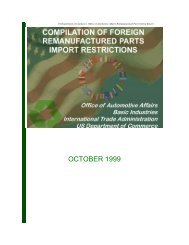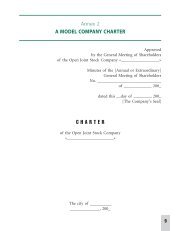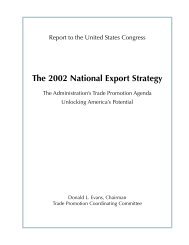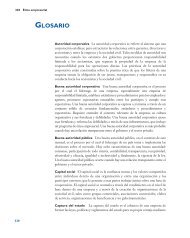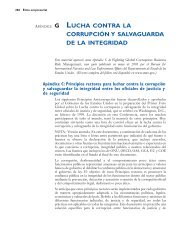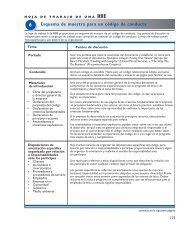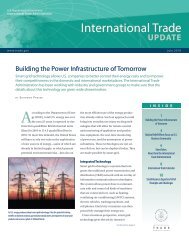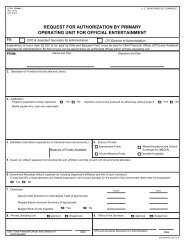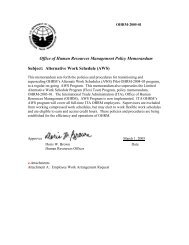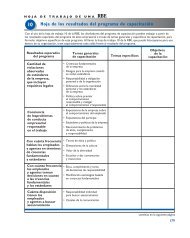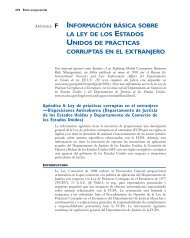Global Steel Trade; Structural Problems and Future Solutions
Global Steel Trade; Structural Problems and Future Solutions
Global Steel Trade; Structural Problems and Future Solutions
Create successful ePaper yourself
Turn your PDF publications into a flip-book with our unique Google optimized e-Paper software.
Community Economic Adjustment<br />
Initiative<br />
Coordinates federal response. Provides a<br />
coordinated response to these affected regions<br />
utilizing resources of the Departments of<br />
Agriculture, Commerce, Education, Labor, <strong>and</strong><br />
Treasury; the Small Business Administration; <strong>and</strong><br />
other federal agencies. This will ensure that<br />
communities are aware of all available federal<br />
resources <strong>and</strong> that federal agencies respond in a<br />
coordinated way both in Washington <strong>and</strong> on the<br />
local level.<br />
Creates an Office of Community Economic<br />
Adjustment (OCEA). Crafts <strong>and</strong> coordinates<br />
Administration-wide responses <strong>and</strong> provide initial<br />
recovery funds for regions experiencing severe<br />
<strong>and</strong> sudden economic distress.<br />
Exp<strong>and</strong>s economic adjustment assistance by<br />
$175 million over five years. The Administration<br />
will propose a $35 million per year increase in<br />
additional economic adjustment funding as part of<br />
EDA’s budget.<br />
economic dislocations. The Initiative is modeled<br />
after the Department of Defense’s highly<br />
respected Office of Economic Adjustment—the<br />
federal government’s first point of contact with<br />
communities slated for a military base closure.<br />
Under the CEAI, an Office of Community<br />
Economic Adjustment (OCEA) would be<br />
created within EDA to coordinate<br />
Administration-wide responses <strong>and</strong> provide<br />
initial recovery funds to regions experiencing<br />
sudden <strong>and</strong> severe economic distress regardless<br />
of cause. The OCEA would focus on, but not be<br />
limited to, communities affected by trade. The<br />
OCEA will ensure that communities are aware<br />
of all available federal resources <strong>and</strong> that<br />
federal agencies respond in a coordinated way<br />
both here in Washington <strong>and</strong> at the local level.<br />
OCEA will provide planning grants <strong>and</strong><br />
technical assistance to help communities<br />
organize themselves <strong>and</strong> develop an economic<br />
adjustment strategy. The Initiative also exp<strong>and</strong>s<br />
EDA’s Economic Adjustment program to assist<br />
communities in implementing their adjustment<br />
strategy. On June 21, 2000, Representative John<br />
Larson of Connecticut, on behalf of a bipartisan<br />
group of 163 original co-sponsors, introduced<br />
the Community Economic Adjustment Act of 2000 (H.R. 4711), which closely tracks the President’s<br />
proposed initiative (see box).<br />
Address Market-Distorting Practices<br />
in <strong>Global</strong> <strong>Steel</strong> Markets<br />
Bilateral Engagement<br />
Bilateral engagement with foreign governments has proved to be an important means through which U.S.<br />
concerns over structural distortions in the steel sector can be raised <strong>and</strong> addressed, such as occurred with<br />
the Korean steel company, Hanbo <strong>Steel</strong>. The Administration pursued a comprehensive strategy to obtain an<br />
expeditious <strong>and</strong> commercially viable solution (see box, next page).<br />
This successful approach will be used to address the underlying structural problems in the global steel<br />
industry. This will include the following:<br />
• Intensive monitoring.<br />
• Increased analysis by the Department of Commerce’s Subsidies Enforcement Office to assess whether<br />
any activities identified constitute actionable subsidies under the WTO Agreement.<br />
• Focused bilateral engagement through the ongoing formal dialogues on steel led by USTR; through<br />
informal bilateral meetings at all levels of government; <strong>and</strong> through multilateral forums such as the<br />
OECD <strong>Steel</strong> Committee.<br />
• Potential WTO dispute settlement action.<br />
This process of engagement will involve the concerted interagency efforts of the Administration.<br />
178 <strong>Global</strong> <strong>Steel</strong> <strong>Trade</strong>: <strong>Structural</strong> <strong>Problems</strong> <strong>and</strong> <strong>Future</strong> <strong>Solutions</strong>



